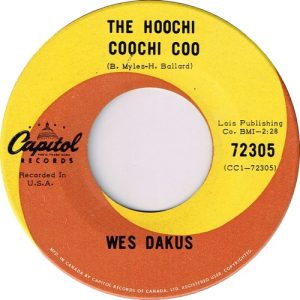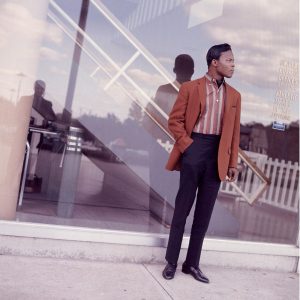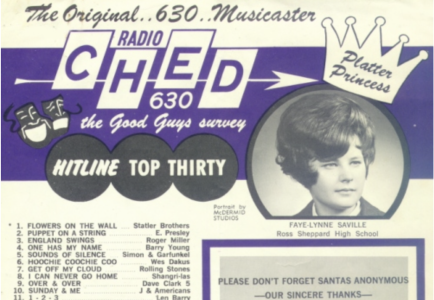#70: Hoochie Coochi Coo by Wes Dakus
City: Edmonton, AB
Radio Station: CHED
Peak Month: December 1965
Peak Position in Edmonton: #6
Peak position in Vancouver ~ did not chart
Peak Position on Billboard Hot 100 ~ did not chart
YouTube: “Hoochi Coochi Coo” – n/a
Original “Hoochie Coochie Coo” – Hank Ballard and the Midnighters (1960)
Lyrics: “Hoochie Coochie Coo”
In 1938, Wes Dakus was born in Mannville, Alberta. He moved to Edmonton and formed The Rebels in 1958. The Rebels quickly became one of the most popular predominantly instrumental groups on the prairies. They performed in rural hotels and seniors drop-in centres. Initially the band was known as the CJCA Rebels. It was Edmonton radio station that promoted them. CJCA gave The Rebels air-time on its local talent features and helped them with the bookings. The Rebels became one of the regular bands at The Commercial and The Rainbow Ballroom in Edmonton. By the time Dakus caught the attention of Quality Records’ VP Lloyd Dunn, he and The Rebels had gotten to know Alberta’s roads like the backs of their hands. By this time The Rebels were making tours across western Canada. The band travelled to Clovis, New Mexico where they recorded with Buddy Holly’s producer Norman Petty. He ultimately became their manager, and two singles were released under the name of The Club 93 Rebels, a nod to their radio station sponsor CJCA 930-AM.
In 1960, the singles “El Ringo”, “Taboo” and “Pink Canary” got airplay in Edmonton. In 1962, in an effort to cash in on the ‘Twist craze,’ The Rebels released the instrumental “Cavalier Twist”. And in 1963 they released “Dog Food”, with the spoken word opener “Here boy.”
A string of singles came out in 1964. The first was “Sidewinder”, which made the Top Ten in Edmonton and Moose Jaw (SK). This was followed by “Pedro’s Pad” and “Las Vegas Scene”. In 1965, Wes Dakus released “Hobo” which climbed to #9 in the RPM Canadian singles chart. Their biggest national hit on the singles chart in Canada came in 1966 with “The Hoochi Coochi Coo”.

“Hoochi Coochi Coo” was co-written by Billy Myles and William Myles Nobles was born in 1924 in the USA. In 1956 he penned a doo-wop song titled “Tonite Tonite”, which was a modest hit for the Mello-Kings. Though the song eventually sold over 3 million records, it stalled at #77 on the Billboard pop chart in the summer of 1957. That year, Myles released a solo effort titled “The Joker (That’s What they Call Me)”. It peaked at #13 on the B&B chart and #25 on the Billboard pop chart. Myles made an appearance on The Ed Sullivan Show in 1958, on the same bill with Buddy Holly. In 1959, he appeared in the British film Swing Beat, alongside The Mellokings and The Five Satins. In 1960, he wrote “(You Were Made for) All My Love” which was a #12 hit for Jackie Wilson. Myles also wrote “Have You Ever Loved A Woman”, which was recorded by Freddie King, and later by Eric Clapton in 1970. Myles wrote songs that were recorded by The Dubs, Little Willie John, Baby Washington, Gladys Knight & the Pips, Johnny Mathis, Brook Benton, Lou Rawls and others.
“Hoochie Coochie Coo” was originally recorded by Hank Ballard & the Midnighters in 1960. It spent eight weeks in the Top Ten on the Cashbox Top 50 in R&B Locations chart from December 1960 to February 1961. It also peaked at #23 in the Billboard Hot 100. Ballard’s original version was a Top Ten hit in Denver, Springfield (MA), Wheaton (MD), Rockville (MD), Minneapolis/St. Paul, Trenton (NJ), Nashville, Jacksonville (FL), Arlington (VA), Mobile (AL), Atlanta, Memphis, and Tucson (AZ). Myles lived in Greenville, NC, and ran his publishing company Selbonn Music Inc. Billy Myles died in 2005 at the age of 81.
The other songwriter of “Hoochi Coochi Coo” was Hank Ballard (born John Henry Kendricks in Detroit in 1927). He sang in church and worked on a Ford Motors assembly line in his mid-teens. In 1953 he was part of a group called The Royals who had a Top Ten R&B hit titled “Get It”. They changed their name to the Midnighters in 1954. That year Ballard wrote a 12-bar blues tune titled “Work With Me Annie”. The single shot to number-one and remained there for eight consecutive weeks on the Cash Box Rhythm & Blues Top 15 chart. The single also climbed to #22 on the Billboard Pop chart. This was followed by “Sexy Ways”, a #2 hit in ’54, and “Annie Had A Baby”, which shot to number-one late in 1954. Hank Ballard and the Midnighters had more Top Ten success with “Annie’s Aunt Fannie”, and “It’s Love Baby” in the winter of 1954-55. Ballard waited until 1958 to have another Top Ten R&B hit with “Teardrops On Your Letter”. Late that year he wrote a song called “The Twist”. Though it was a modest success for Ballard, it was a number-one hit for Chubby Checker in both 1960, and 1962.

Hank Ballard, 1954
With the success of “The Twist”, there was renewed interest in the person who wrote the song. Hank Ballard and the Midnighters had Top Ten hits in 1960 with “Finger Poppin’ Time” and “Let’s Go, Let’s Go, Let’s Go”. The followup was “The Hoochie Coochie Coo” in early 1961. Hank Ballard and the Midnighters had three more Top Ten R&B hits in 1961: “The Switch-A-Roo”, “The Float”, and Nothing but Good”. In 1968, Ballard had a Top 20 R&B hit titled “How You Gonna Get Respect”. His cousin Florence Ballard was a member of The Supremes. Hank Ballard died in 2003 at the age of 66.
The recording by Wes Dakus dropped the letter “e” from ‘hoochie’ and ‘coochie’ rendering the song title “Hoochi Coochi Coo”. There is no recording of the Wes Dakus release from 1965 online at this time of posting. If that changes, I’ll add a link. I assume that Wes Dakus recorded a version similar to the Hank Ballard original, with vocals.
The Hoochie Coochie Coo is a dance described in the Hank Ballard song. It causes a commotion such that the singer warns that papa is going to bring a hickory stick. The dancers swirl, shake like they’re breaking, swish, spin, shimmy, dip up and down, and go round and round. In the song, this is all happening in a kitchen in the house of a gal named Sue.
“Hoochi Coochi Coo” peaked at #6 in Edmonton, and made the Top 50 in Houston (TX).
The positive reviews and attention got them a spot on the back of Buddy Knox’s North American tour. Their first full album was in the stores in the fall of 1965 – The Wes Dakus Album with The Rebels. The personnel on the album were Stu Mitchell on drums and backing vocals. He was born in 1942. Robert “Bob” Clarke was born in Edmonton and played guitar along with backing vocals. Dennis Paul played bass guitar. Barry Allen also played guitar and added vocals.
In 1965, RPM Magazine voted Wes Dakus & The Rebels Canada’s top instrumental group for the second straight year.
The single “Wheels” was released under the title of The Dundeeville Players featuring George Tomsco on guitar, and another pair of singles followed in ’66 – “She Ain’t No Angel” and “We’ve Got A Groovy Thing Going”. The latter was a Top 5 hit in Peace River (AB) on CKYL.
In 1967, Wes Dakus recorded a cover of Jr. Walker and the All-Stars hit single “Shotgun”. The cover had a Monterey-pop-festival vibe reflective of the driving rock/psychedelic pop-rock sound in the Summer of Love. It made the playlist on CFUN in Vancouver in the spring of 1967. In 1968 The New Sound of Wes Dakus released a final single titled “Organized”.
Dakus set aside recording and performing at the end of the Sixties. In the early 70s, he opened an artist management company and his own studio in Edmonton called Sundown Recorders. Soon, he became one of western Canada’s most sought-after producers. He produced records for Darkroom, One Horse Blue, Mavis McCauley, and Randy Bachman, among many others. Wes Dakus died in Vancouver, BC, in 2013.
Stu Mitchell went on to be a member of The Preachers in the late 60s, and Privilege in the 1970s. He also recorded a single in 1971 titled “A Nice Young Girl From Texas”. In the early 80s he anchored the house band for Sun Country on CFRN-TV in Edmonton, hosted by Ian Tyson. Stu Mitchell died in 2022 at the age of 79. The Edmonton Journal reported that Mitchell was “born and raised in Saskatchewan.” His obituary tells that when Stu was a teen in Saskatoon’s T-Birds band, he was spotted by Wes Dakus, and invited to join The Rebels.
Dennis Paul went on to be a member of the Calgary band the Gainsborough Gallery.
While he was with The Rebels, Barry Allen also recorded as a solo artist. His hit singles in Canada in the mid-60s include “Love Drops” and “Armful of Teddy Bears”. He formed Southbound Freeway in 1967 and concurrently continued with Wes Dakus’ Rebels into 1968. From 1969 to 1972, Allen hosted a variety show in Calgary titled Come Together. The TV shows backup band, Cheyenne Winter, toured with him in 1971. In 1972 he formed Painter, which included some former members of the 49th Parallel. He produced records after he established Bumstead Studios. He won a number of awards as a producer and in 2013 relaunched The Rebels after Wes Dakus died. At the age of 74, in 2020, Barry Allen died after a battle with cancer.
February 8, 2025
Ray McGinnis
References:
“Wes Dakus,” canadianbands.com.
“Musician Made his Unique Mark: Rebels’ Drummer Mitchell recalled as essential part of music scene,” Edmonton Journal, October 1, 2022.
Michael Jack Kirby, “The Fireballs,” waybackattack.
Barry Allen and Dwayne Osepchuk, “Barry Allen,” Canadianbands.com, April 11, 2022.
Ian Courtney, “Canadian Recording Artist and Producer, Barry Allen, Dies,” Celebrity Access, April 6, 2020.
Spencer Leigh, “Hank Ballard,” Independent, March 4, 2003.

CHED 630-AM Edmonton (AB) Top Ten | December 19, 1965

Leave a Reply